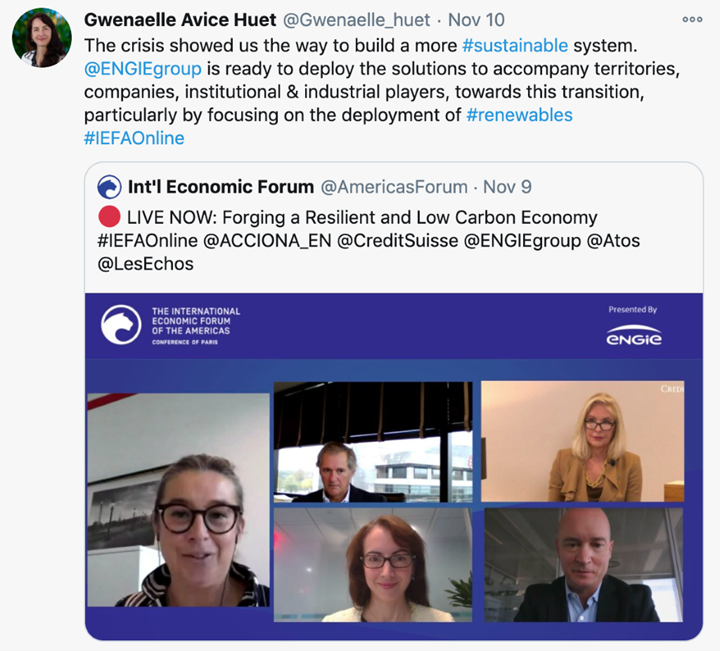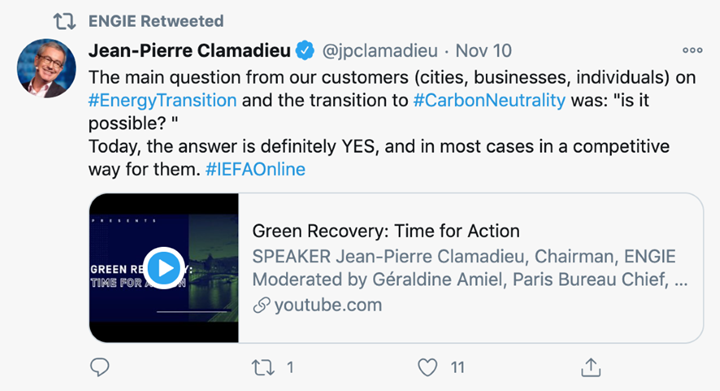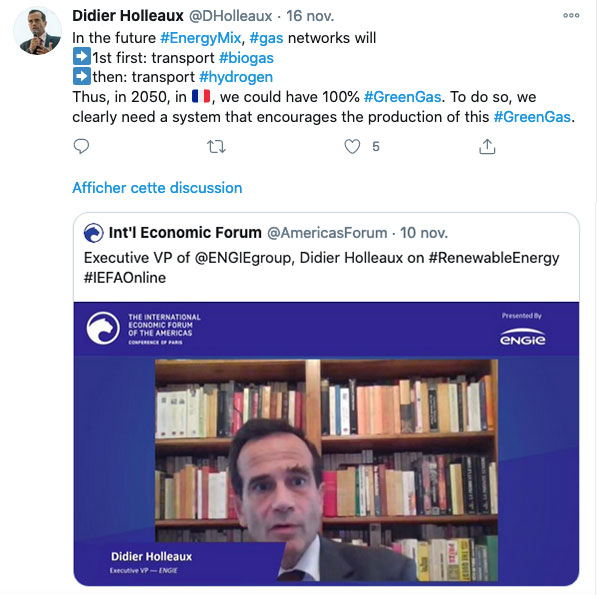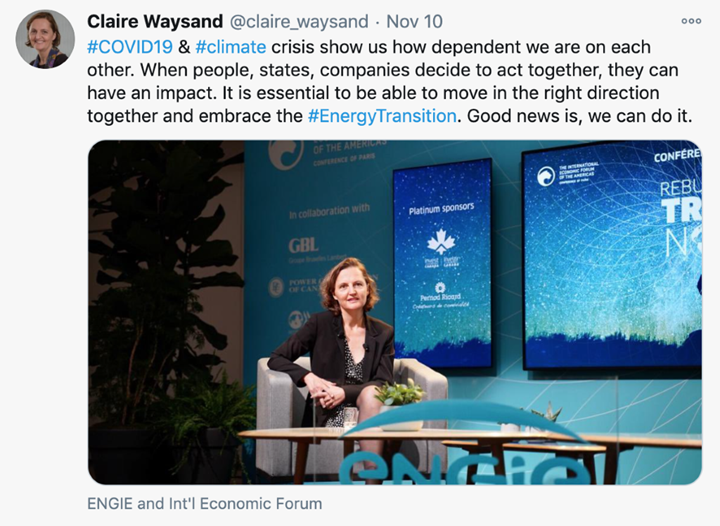Veuillez accepter les cookies "marketing" pour voir cette vidéo.
Opening address: a step up in awareness
Opening remarks were made by Angel Gurria, Secretary-General of the OECD, presenting the panel “forging a resilient and low carbon economy” with speakers José Manuel Entrecanales, CEO of Acciona, Lara J. Warner, Chief Risk and Compliance Officer and Member of the Executive Board at Crédit Suisse, and Philippe Mareine, Chief Digital & Transformation Officer and Head of CSR at ATOS. Then, ENGIE Executive Vice President Gwenaëlle Avice-Huet pointed out that the pandemic had shown ENGIE customers and partners that achieving carbon neutrality in the coming years is vital, confirming the direction taken by the Group.

“The Great Moment” with Jean-Pierre Clamadieu: “Green Recovery: time for action”
The Great Moment was a 60-minute programme recorded live from an ENGIE studio. In the first part of the programme, Géraldine Amiel, Bloomberg’s Paris Bureau Chief, asked Jean-Pierre Clamadieu, Chairman of ENGIE’s Board of Directors, to share the two key areas he believes are necessary to achieve carbon neutrality in the long term: better and lower energy consumption.
BETTER involves investing heavily in renewables, LESS involves reducing energy consumption and optimising its use. He took the opportunity to point out that ENGIE began pursuing this vision several years ago and helps its customers and partners take the necessary action.
"Our clients often ask us: can we achieve carbon neutrality?
The answer is YES! and in most cases, we can do it competitively".
Jean-Pierre Clamadieu, Chairman of ENGIE’s Board of Directors

Seizing opportunities
In the second part of the programme, American economic and business leaders were invited to share their view of the opportunities for a global green recovery. Glenn Hutchins, Co-Chairman of the Brookings Institution, compared the economic crisis caused by the COVID-19 pandemic to the aftermath of World War II.
“Like after World War II, the consequences of the COVID crisis could be very constructive for our economies”
Glenn Hutchins, Co-Chairman of the Brookings Institution
He believes that, just as massive public investment in research and innovation led to huge economic growth and job growth in the United States, the green recovery has the same opportunity to do that – in energy infrastructure, construction, water, transport, etc. Joe Biden has proposed a $1.7 trillion spend on the green economy over the next ten years, which Glenn believes should help the recovery.
Tomorrow’s jobs – a challenge for the green recovery
In response to Glenn Hutchins, Jean-Pierre Clamadieu added that the green recovery is also an opportunity to train young people and employees in skills for the future, like building energy renovation, for example – with the aim of reducing energy consumption – particularly through apprenticeship.
Taking immediate action together to achieve the energy transition
Afsaneh Beschloss, Founder and CEO of investment management firm RockCreek and an economist, highlighted the danger of a wait-and-see attitude: “delaying action on the climate will expose us to slower growth and increase the risks in terms of climate impact, on air pollution and health issues for example. The cost of climate change will increase the longer we leave it.”
Questioned by Afsaneh Beschloss on the subject of cooperation between the United States, Europe and China, Jean-Pierre Clamadieu said that China’s recent announcement that it aimed to reach carbon neutrality in 2060 – although less ambitious than the European target – is a strong signal that dialogue and action will be possible.
Day 2: Opening address by Bruno Lemaire
The French Minister of the Economy and Finance, Bruno Lemaire opened the second day of the conference. He outlined his recovery roadmap: investments in renovating public buildings, relocating industrial production and the new technologies to which it gives rise, storage and production of green hydrogen, by building high-capacity production units over the coming three years.
Welcoming Joe Biden’s announcement that he would re-join the Paris agreement, he highlighted the importance of a strong relationship between Europe and the United States in order to face today’s challenges together.
“We can protect our economy and launch a recovery plan at the same time.
We must take action now.”
Bruno Lemaire, French Minister of the Economy and Finance
Designing a global energy mix
During the panel entitled "Ensuring resilience in a renewable energy mix” with Benoît Potier, CEO of Air Liquide and Jose Luis Manzano, President of Integra Capital, Didier Holleaux, ENGIE Executive Vice President explained that a short, medium and long-term vision were necessary. He highlighted the importance of reducing consumption and finding a balance between the different energy sources, by improving reliability through globally managed production, storage and transport.
“We must develop biogas. As it can be stored and transported in existing networks, it can produce heat when and where you need it.”
Didier Holleaux, ENGIE Executive Vice President

Corporate purpose: a focus in times of turbulence
Towards the end of the two-day conference, Claire Waysand, interim CEO at ENGIE, participated in a panel focusing on the importance of purpose. She stressed the responsibility of every player in the energy transition and, particularly, the responsibility for action by large corporations as leaders in societal change.
“The pressure applied by our customers, employees and investors every day is essential for us to move in the right direction.”
Claire Waysand, interim CEO at ENGIE

